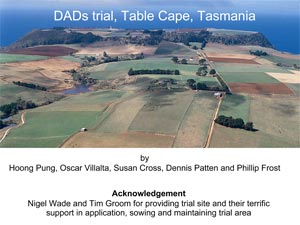|
|
White rot caused by Sclerotium cepivorum is the most important, widespread and destructive fungal disease of onions and spring onions in Australia. Once introduced, the disease can quickly spread within and between paddocks and can cause complete crop loss. The pathogen is particularly difficult to manage, as it can remain dormant in the soil for many years until the next crop is planted. White rot disease is considered to be a major threat to the long-term viability of onion production in Australia.
These notes describe the results of field trials to evaluate the effectiveness of the germination stimulant of sclerotia DADS, used alone and in combination with fungicides and other treatments for the management of White rot on onions. Conclusions :
Acknowledments : This project has been facilitated by Horticulture Australia Limited, and has been funded by voluntary contributions from Syngenta Crop Protection Pty Ltd and the Australian Government. Nigel Wade and Tim Groom for providing trial site and their terrific support in application, sowing and maintaining trial area. This study was conducted as part of project VG00048, led by Dr. Ian Porter of Primary Industries Research Victoria. The funding of this project by Horticulture Australia Limited and vegetable growers is gratefully acknowledged. We would like to thank the Tasmanian growers, Mr. David Bovill, Mr. Richard Bovill, Mr. Colin Houston, Mr. Dennis Davis, and Mr. Jeremy Rockcliff, for providing trial sites, as well as their field staff for their assistance in planting and overall maintenance of the trial areas. We are grateful to Mr. John Hill of Hills Transplant Pty Ltd, for his assistance in transplant treatments at the plant nursery. Field trials at Cambridge and Margate in southern Tasmania were conducted with the assistance of Mr. Dennis Patten and Dr. Lee Peterson, Serve-Ag staff based in Hobart. Other Serve-Ag staff, who also assisted in this project, are Peter Aird and Sarah Lamprey. Mark Shakelton at CSIRO Entomology, Perth, conducted plant analysis for isothiocyanates in brassica green manure tissues. |
||||||||
|

